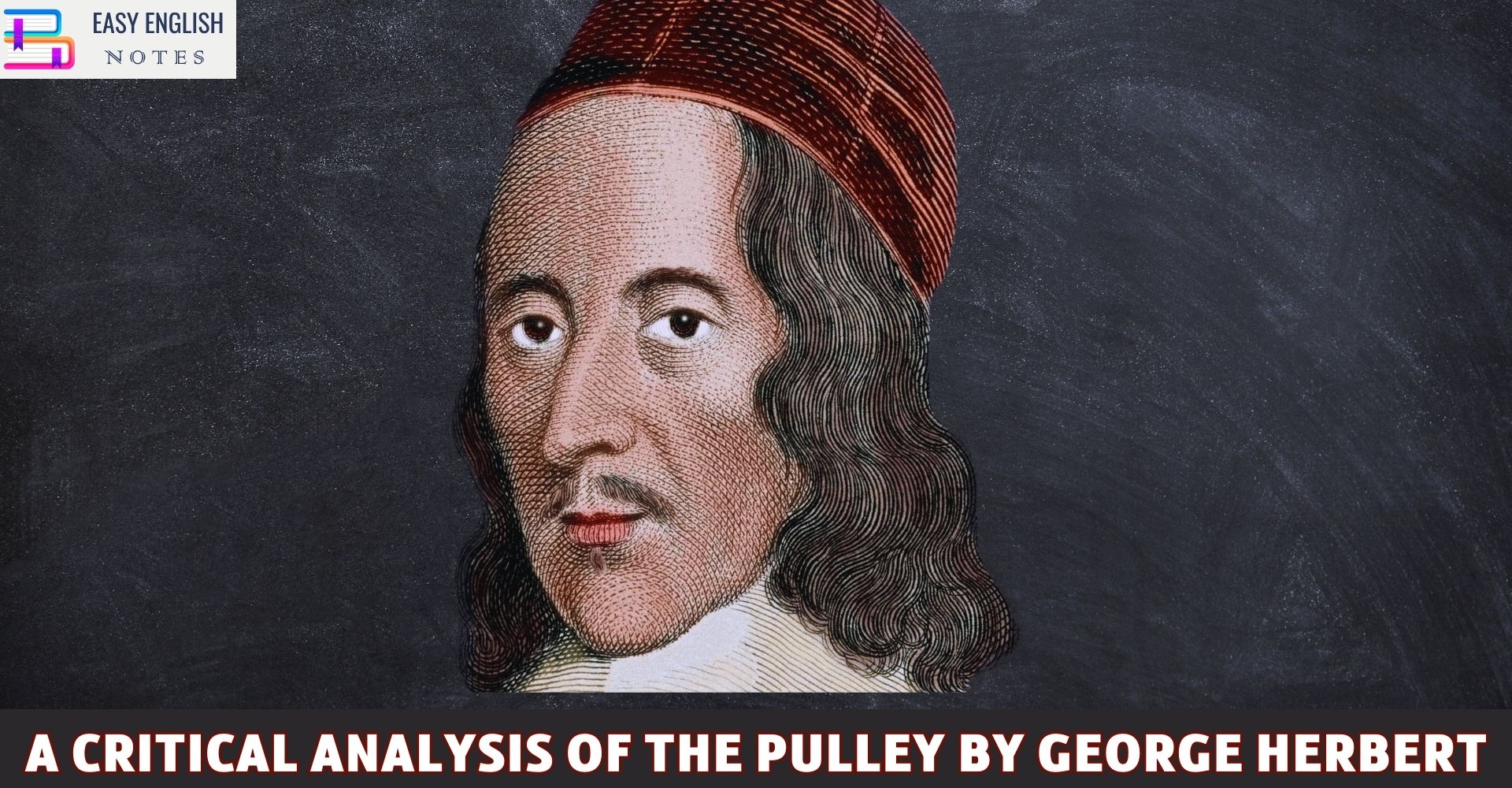“The Pulley” is a profound devotional composition penned by the esteemed poet George Herbert, renowned for his association with the metaphysical school of poetry. Within this poignant piece, Herbert contemplates the gifts bestowed upon humanity by God, utilizing the metaphor of a pulley—a mechanical device employed to effortlessly elevate heavy loads. In the poem, man’s inherent restlessness is likened to a pulley designed to draw him closer to the divine.
As the pinnacle of God’s creative workmanship, man was crafted with meticulous care, eliciting immense delight from the Almighty. Showering humanity with numerous gifts, God withheld only one—rest. Initially, God granted man strength, followed by wisdom, honor, pleasure, and beauty. However, the gift of rest was intentionally withheld, guided by a strategic purpose. Granting man unbridled rest and tranquility would result in his indifference towards God’s existence. Consequently, God would be deprived of the worship rightfully owed to Him, and man would lack the inclination to seek closeness with the divine. Thus, both God and man would suffer losses. Recognizing the profitability of this diplomatic maneuver, God understood that bestowing man with all gifts would render him self-sufficient, eliminating the need for divine adoration. Nonetheless, a life devoid of rest and inner peace would be destitute. The perpetual restlessness within man’s core would persist as a persistent thorn, serving as a catalyst, drawing him towards God. Though man may not initially contemplate God out of pure benevolence, he would inevitably look towards the divine when wearied by the ceaseless restlessness and the loss of peace within his soul.
This poem epitomizes Herbert’s unique style, characterized by cleverness and wit, coupled with profound sincerity and emotional resonance. Employing simple and familiar imagery, the poet crafts an engaging and relatable piece that resonates with readers.
The choice of the title, “The Pulley,” is both ingenious and appropriate, providing valuable insight into the essence of the poem and its underlying purpose. A meticulous analysis of the title reveals its perfect aptness and intelligence. By employing the metaphor of a pulley—a mechanical apparatus utilized for effortlessly lifting heavy loads—the title encapsulates the central theme of the poem. In this context, man’s innate restlessness is likened to a pulley designed to elevate him towards God. Thus, the title effectively justifies its selection.
Also Read :
- Compare Hamlet with Macbeth, Othello and other Tragedies
- “The Pardoner’s Tale” is the finest tale of Chaucer
- Prologue to Canterbury Tales – (Short Ques & Ans)
- Confessional Poetry – Definition & meaning
During the divine act of creation, God lavished humanity with His abundant gifts, reserving only one—the precious gem of “rest” or peace of mind. Recognizing that bestowing man with this gift would lead to indifference towards the creator and a dismissal of His other bestowed blessings as mere natural occurrences, God strategically withheld rest. However, this act was not driven by a desire to sever all connection with His finest creation, man. Instead, God withheld rest with a purpose in mind. Deprived of mental serenity, man would find himself disillusioned with life, desperately seeking solace and comfort. In his pursuit of peace, man would ultimately turn to God, seeking solace and consolation within the divine embrace. It is with this profound intention that God chose to withhold the gift of “rest” from humanity.
George Herbert’s masterful composition, “The Pulley,” delves into the intricate relationship between humanity and the divine. In this contemplative piece, the poet reflects upon the deliberate withholding of rest by God, leading man on a path of spiritual awakening and communion.
As God embarked upon the creation of His masterpiece, humanity, He bestowed upon man a myriad of gifts, each a testament to His boundless generosity. However, amidst this profusion of blessings, God chose to retain a single gift—rest. His foresight recognized that if man were to possess the tranquility of mind and soul, he would perceive all bestowed gifts as mere natural occurrences, neglecting his connection to the divine. Aware of the delicate balance required, God refrained from severing His ties with His most cherished creation, opting instead for a calculated approach.
By withholding rest, God ensured that man’s life would be marked by a profound absence—a longing for peace that would persist as a constant thorn in his being. This relentless yearning for tranquility would serve as a pulley, gently tugging at man’s spirit, drawing him ever closer to God. While man may not initially incline towards thoughts of divinity purely out of altruism, it is during moments of weariness, when restlessness engulfs his existence and the loss of inner peace renders life insipid, that he finds himself compelled to turn his gaze upward, seeking solace in the divine presence.
“The Pulley” exemplifies the distinct style and depth of George Herbert’s poetry. Its title, carefully chosen, encapsulates the essence of the poem and its underlying message. A pulley, an ingenious mechanical device designed to facilitate the lifting of heavy weights with ease, serves as a metaphor for man’s restlessness and his ultimate quest for transcendence. The title not only provides a concise summary of the poem but also reflects the purpose behind its composition.
In this evocative work, Herbert’s use of vivid imagery and relatable concepts ensures a strong connection with the reader. The homely and familiar references employed throughout the poem elicit a profound sense of identification, resonating deeply within the human experience.
“The Pulley” stands as a testament to Herbert’s mastery, deftly intertwining cleverness and wit with sincere emotion. Its profound exploration of the human condition and the delicate interplay between restlessness and spiritual awakening leaves an indelible mark on the reader’s mind, inviting contemplation and reflection.
PLEASE HELP ME TO REACH 1000 SUBSCRIBER ON MY COOKING YT CHANNEL (CLICK HERE)











